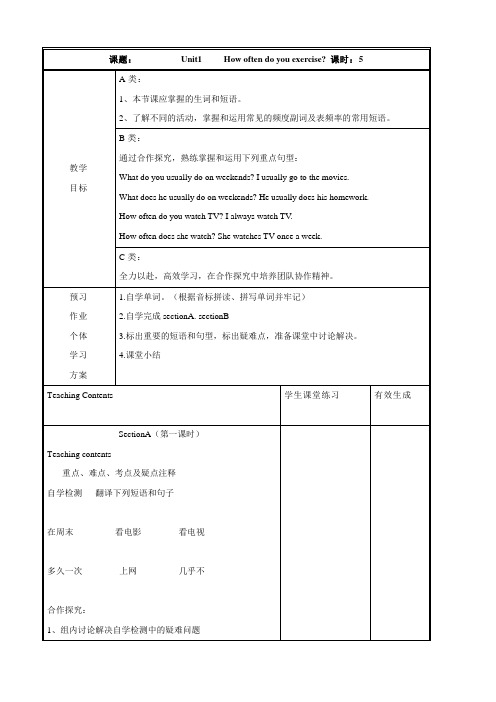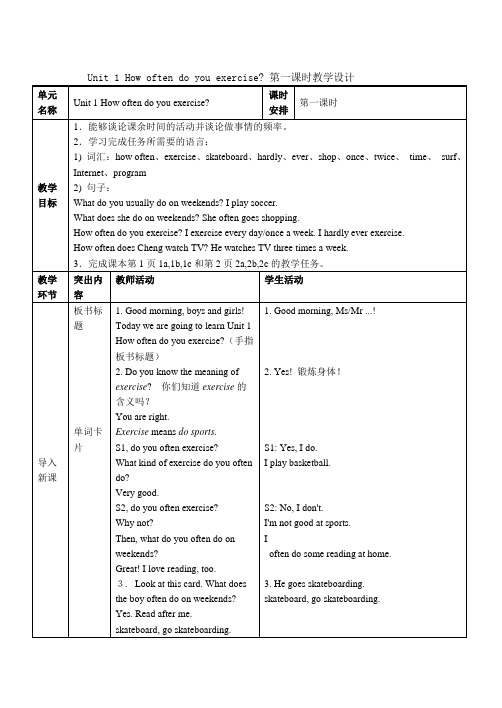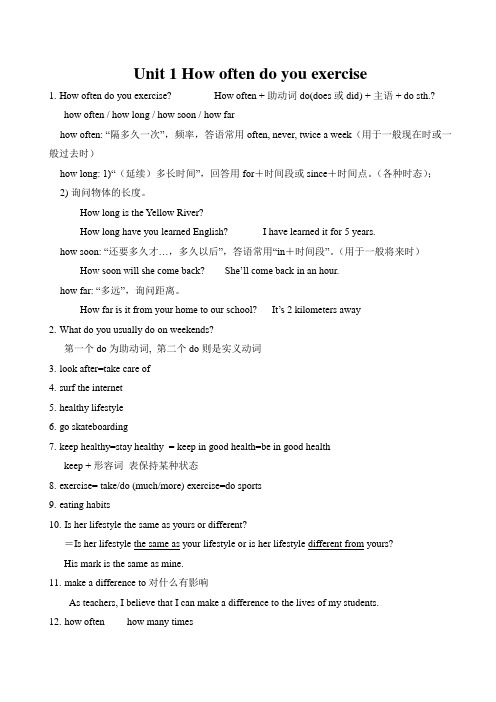Unit_1_How_often_do_you_exerciseAKUKlU
英语:unit1《How often do you exercise》教案 (人教版八上)

4.time,时间,倍数,次数
﹙1﹚作不可数名词“时间,时刻” Time is money.时间就是金钱。
作可数名词,“倍数,次数”Your house is 3 times as large as mine.
拓展:on time按时
At a time一次,一度
In time及时
做连词“一旦”如:Once the sun had set, the air turned cold.一旦太阳落山,空气就变冷了。
拓展:at once立刻,马上如:I will do it at once.
Once upon a time从前Once upon a time there was an old man .
2. How often does she drink milk?
3. Does she eat junk food very often?
4. Do you think she has a healthy lifestyle? Why or why not?
5. Is Bill’s lifestyle the same as yours or different? What are the differences?
4. How often does Chen watch TV? He often watches TV three times a week.
看表格填空:All students = 100% Most students = 51% --- 99% Some students = 1% --- 50% No students = 0% Green high school: Activity Survey Activity Every day once or twice a week three or four times a week Exercise 15℅ 10℅ 75℅ Do homework 95℅ 0℅ 5℅ Watch TV 85℅ 2℅ 13℅ Here are the results of the student activity survey at Green High School. (1)______ students exercise three or four times a week. Some students exercise once or twice a week. (2)_______ students are very active,and exercise every day. As for homework, (3)_____ students do homework every day. (4)_______students do homework three or four times a week. (5)_____ students do homework once or twice a week. The results for “watch TV” are interesting. (6)_____ students watch TV once or twice a week, some students watch TV(7) ______ ____ ____ _____a week, but most students watch TV (8)_____ ______ .
八年级英语上册Unit 1 How often do you exercise 人教新目标版

八年级英语Unit 1 How often do you exercise? 人教新目标版【本讲教育信息】一. 教学内容:Unit 1 How often do you exercise?[学习过程]一. 单元内容:How often do you exercise?二. 单元目标:1. Wh- 问句2. How often……?问句3. 表示频率的副词4. 不定代词all, most, some, none的用法。
三. 重点单词:always adv. 总是usually adv. 通常often adv. 经常sometimes adv. 有时hardly ever 几乎不曾;很少never adv. 从不exercise v. 锻炼n. 练习shop v. 购物n. 商店skateboarding n. 溜滑板运动once adv. 一次twice adv. 两次three times a week 一周三次every day 每天milk n. 牛奶junk food 垃圾食品drink v. 喝. n. 饮料四. 重点短语how often 多长时间一次 a lot of 许多look after 照料try to do sth 尽力去做某事start with 以……开始as for 至于make a difference 有重要性do exercise 做运动surf the internet 上网五. 重点句子1. What do you usually do on weekends?周末你通常做什么?I usually play soccer.我经常踢足球。
2. What do they do on weekends?他们周末干什么?They often go to the movies.他们经常去看电影。
3. What does he do on weekends?他周末干什么?He sometimes watches TV.他有时候看电视。
八年级英语上册Unit1Howoftendoyouexercise知识点总结人教新目标版

⼋年级英语上册Unit1Howoftendoyouexercise知识点总结⼈教新⽬标版Unit 1 How often do you exercise1.What do you usually do on weekends? 你周末常常做什么?(1)这是⼀个由疑问词what引导的特殊疑问句。
前⼀个do为助动词,构成疑问句结构,后⼀个do为实义动词(或叫⾏为动词),意思是“做;⼲”。
注意:助动词do要随着主语的⼈称、时态和数的不同作出相应的变化。
如:▲What does she do on weekends? 周末她做什么?(2)usually为频率副词,意思是“通常;经常”,与often意思相近,但程度有别。
【辨析】:频率副词always, usually, often, sometimes, hardly ever, never【拓展】频率副词always的⽤法:在所有的频率副词中,always语⽓最强,表⽰“总是;永远”。
①always可⽤于进⾏时态,表⽰“⽼是;总是”,是⼀种加强语⽓的说法,含有“⽓愤;不满;不耐烦;赞赏”等感情⾊彩。
如:▲He is always coming late. 他总是迟到。
(埋怨)▲ He is always helping others. 他总是帮助别⼈。
(赞扬)②always通常放在be动词后⾯,⾏为动词前⾯,⼀般不放在句⾸。
但为了强调或在祈使句中,也可放在句⾸或放在整个谓语前⾯,有时甚⾄置于句末。
如:▲ Always pay attention to your pronunciation. 要始终注意发⾳。
③always与not连⽤时,表⽰部分否定,意思是“不⼀定总是;未必”等。
如:▲ Honesty is not always the best policy. 诚实未必永远是上策。
(3)on weekends 意思是“在周末”,也可说成at (the) weekends, 此处的weekends指星期六和星期⽇。
unit-1how-often-do-you-exercise[上学期]section-a--新目标
![unit-1how-often-do-you-exercise[上学期]section-a--新目标](https://img.taocdn.com/s3/m/e1b0e968aeaad1f346933fec.png)
有时 某个时间 一段时间 几次
用 sometimes , sometime, some times , some time 填空:
1.He s_o_m__e_ti_m__es_ goes to school by bus.
2.I told you _s_o_m__e__ti_m_e_s_,but you still forgot it.
5. He hardly ever surfs the Internet. __H__o_w__ _o_ft_e_n__ _d_o_e_s_ he _s_u_r_f__ the Internet?
Activities
how often
surf the Internet hardly ever
read English books every day
3.The Whites will go to America _s_o_m__e_ti_m_e_ this year.
4.Brad watched TV for _s_o_m__e_t_im__e_ last night.
Summary
1. 格林高中 Green High School
2. 活动调查 activity survey
Report: The good habit for English study
• Read English loudly every day. • Join the English corner once
or twice a week.
• ……
Do you know?
• sometimes • sometime • some time • some times
_H__o_w__ _o_ft_e_n_ __d_o_e_s_ she __g_o__ to see her grandpa?
Unit1 How often do you exercise-

Unit1 How often do you exercise?Unit1 H ften d u exerise?1 疑问词h的用法(1)怎样,用什么手段,方法/交通工具H are u? / H is she?H did he d it? / I dn’t n h t siH d u e t shl?(2) 情况如何(指身体健康状况)H are u?(3) h an,h uh表示“多少”h an后接可数名词复数,h uh接不可数名词。
H an ties d u g t the par?H an pens d u ant?H uh ater d e drin ever da?H uh are thse pants?(4) h ften是对动作发生的“次数”提问,询问的是频率“多久一次”回答可以是:Ever da / ne a ee / Three ties a ee / ften /H ften d u pla tennis?H ften d u surf the Internet() H ld? 询问年龄H ld are u? I a five(6) H abut…? ……如何?……怎么样?H abut ging t the vies? 2tie表示不可数名词,意为“时间”。
表示可数名词,意为“次数,倍数”hat tie is it?I g t the vies three ties a ee注意“次数”的表达方法一次ne,两次tie,三次或三次以上用基数词加上ties:three ties、five ties、ne hundred ties表示“……几次”的表达方法是:ne a da/ a ee/ a nth/ a eartie a da/ a ee/ a nth/ a ear3exerise v/n shp v/ nHe ften exerises n eeendse ften d / tae exerise n eeendse ften shp n eeendsThere are an shps in the neighbrhd4 as fr意为“就……而论”,“至于”As fr fruit,I eat it setiesAs fr hi,I never ant t see hi here至于他,我永远不希望在这里见到。
Unit-1-How-often-do-you-exercise教学设计

1. S1: I think they are having a meeting.
S2: I think they are making a survey.
学生们开始在书中写出周末活动。
Right.
3.OK. Now open your books at page 2. Look at 2a. Listen. Cheng is talking about how often he does different activities. Number the activities you hear [1-5].现在请同学们翻开书第二页。看2a部分。程正在谈论他作不同活动的频率。请按照听到的顺序给这些活动按1-5排序。Let's begin.(播放录音2a)
S5: What does the boy with short straight hair do on weekends?
S6: He often watches TV at home.
2 a
&
2b
突出黑板上three times a month
这个短语
板书中的once
板书中的twice
1.Do you watch TV,S2?How often do you watch TV?
2.当我们回答活动频率的时候,我们需要用到“次数”这个单词time. It has another meaning. What is it?它还有一个含义,是什么?
Yes.做时间解释的时候,time是一个不可数名词;做次数解释的时候,time是一个可数名词。How can we say “三次”? “五次”?”一个月三次”?“一年10次”?
Unit 1 How often do you exercise

Unit 1 How often do you exercise教学目标1. 掌握如何恰当地使用频率副词及短语2. 掌握如何描述课余时间的活动安排。
3.合理安排自己的生活,养成健康的生活习惯。
教学重点1. 词汇:①表示“频率”:always, usually, often, sometimes, hardly ever, never, once, twice, three times a week, every day②有关“健康”:junk food, health, unhealthy, habit2. 句型:谈论某项活动或行为的频率e.g.: What do you usually do on weekends?How often do you eat vegetable?Most students do homework every day.教学难点准确理解和运用表示频率的副词和词组。
课时安排Period 1 Section A 1a-1cPeriod 2 Section A 2a-2cPeriod 3 Section A 3-4Period 4 Section B 1a-2cPeriod 5 Section B 3a-4Period 6 Self check and RevisionPeriod 1 Section A 1a-1cStudying aims1. 掌握下列单词:Exercise; skateboard ; hardly ; ever2. 掌握句型:What do you do on weekends ?I often go to the movies.Self-learningTask1﹕learn the new wordsTask2:小组对话练习句型:---What do you do on weeke nds ?---I always do some reading .Task3:完成1a。
八年级英语上册 unit 1 how often do you exercise知识辅导 人教新目标版

Unit 1 How often do you exercise?1. 疑问词how的用法(1)怎样,用什么手段,方法/交通工具How are you? / How is she?How did he do it? / I don’t know how to swim.How do you come to school?(2) 情况如何(指身体健康状况) How are you?(3) how many,how much表示“多少”how many后接可数名词复数,how much接不可数名词。
How many times do you go to the park?How many pens do you want?How much water do we drink every day?How much are those pants?(4) how often是对动作发生的“次数”提问,询问的是频率“多久一次”回答可以是:Every day. / Once a week. / Three times a week. / Often. / ...How often do you play tennis?How often do you surf the Internet.(5) How old...? 询问年龄How old are you? I am five.(6) How about…? ……如何?……怎么样?How about going to the movies?2. time表示不可数名词,意为“时间”。
表示可数名词,意为“次数,倍数”What time is it?I go to the movies three times a week.注意“次数”的表达方法一次once,两次twice,三次或三次以上用基数词加上times:three times、five times、one hundred times.表示“……几次”的表达方法是:once a day/ a week/ a month/ a yeartwice a day/ a week/ a month/ a year3. exercise v/n shop v/ nHe often exercises on weekends.We often do / take exercise on weekends.We often shop on weekends.There are many shops in the neighborhood.4. as for意为“就……而论”,“至于”As for fruit,I eat it sometimes.As for him,I never want to see him here.至于他,我永远不希望在这里见到。
Unit-1-How-often-do-you-exercise单元知识点

Unit 1 How often do you exercise1.How often do you exercise? How often + 助动词do(does或did) + 主语 + do sth.?how often / how long / how soon / how farhow often: “隔多久一次”,频率,答语常用often, never, twice a week(用于一般现在时或一般过去时)how long: 1)“(延续)多长时间”,回答用for+时间段或since+时间点。
(各种时态);2) 询问物体的长度。
How long is the Yellow River?How long have you learned English? I have learned it for 5 years.how soon: “还要多久才…,多久以后”,答语常用“in+时间段”。
(用于一般将来时)How soon will she come back? She’ll come back in an hour.how far: “多远”,询问距离。
How far is it from your home to our school? It’s 2 kilometers away2.What do you usually do on weekends?第一个do为助动词, 第二个do则是实义动词3.look after=take care of4.surf the internet5.healthy lifestyle6.go skateboarding7.keep healthy=stay healthy = keep in good health=be in good healthkeep + 形容词表保持某种状态8.exercise= take/do (much/more) exercise=do sports9.eating habits10.Is her lifestyle the same as yours or different?=Is her lifestyle the same as your lifestyle or is her lifestyle different from yours?His mark is the same as mine.11.make a difference to 对什么有影响As teachers, I believe that I can make a difference to the lives of my students.12.how often how many times13.most of the students=most students14.go shopping=do some shopping15.As for homework , most students do homework every day .as for...常用于句首,其后跟名词、代词或动词的-ing形式(即动名词)As for him,I never want to see him here16.eat less meat17.be good/bad for +名词、代词或动名词18.want (sb. ) to do sth. ask sb. to do sth. tell sb. to do sth. help sb. (to) do sth.====Word行业资料分享--可编辑版本--双击可删====19.try to do sth. try doing sth.e home from school21.of course=certainly=sure22.get good grades23.some advice advice 是不可数名词 a piece of advice 一则建议give advice 提出建议take one’s advice 采纳或听从某人的建议24.Good food and exercise help me to study better. better是well的比较级,而不是good 的比较级help sb to do sth =help sb with sth25.he result of a survey26.That sounds interesting.“主语+系动词+表语” sound(听起来),look(看起来),smell(闻起来),taste(尝起来),feel(觉得),seem(好象),grow(变得),get(变得)等词在英语中可用作系动词,后跟形容词作表语源-于-网-络-收-集。
Unit 1 How often do you exercise 全单元课件

词汇测试 Unit 1Name: No. 一.单词或词组一次______________ 两次___ ________ 节目______________ 习惯_______________巧克力_____________ 锻炼___________ 结果____________ 或许_____________ _必须_____________ 上网冲浪______________ 关于,至于____________ 几乎不___________ __多久一次_____________ 当然_______ _____ 垃圾食品______ _______ 高中____________ _二.完成文章Here are the ___________ (结果)of student lifestyle. In my class, __________ (大多数)students do sports three _________ (次)a week. But some like doing sports very much . They are very ___________ (积极).A few ________ (锻炼)every day. Many have good eating _________ (习惯) . They try ____________ (喝) milk but no ___________ (咖啡) every day. Some only surf the ____________ (网络) on weekends. No students __________ (从不) go __________ (滑板). ____________ (虽然) it’s difficult. There are many ___________ (不同) between students. But one thing is the ________ (相同) ,it’s necessary to keep____ ____ (健康) .Good lifestyle help us to get good ___________ (成绩) , and help us to study _________ (更好.)三.完成句子1.你爸爸多久锻炼一次?每天都锻炼。
Unit_1_How_often_do_you_exercise课件 - 副本

A: What does he do on weekends?
B: He always does homework. A: How often does he do homework?
B: Every day.
shop/ go shopping (hardly ever)
I usually exercise.
How often do you exercise? He reads twice a week. How often does he read?
疑问词 how often 是提问频率 (多久一次), 回答一般是用表示频率的副词。 如:once, twice, three times…, sometimes, often, never, every day, once a week, twice a month, three times a month, three or four times a month 等。
Activities a. go to the movies b. watch TV How often every day once a week twice a week three times a week
c. shop
d. exercise e. read
once a month
twice a month
exercise
A: How often do you exercise?
B:
go to the park (often) four times a week
A: What do they do on weekends? B: They often go to the park. A: How often do they go to the park? B: They go to the park four times a week./ Four times a week.
新目标初二英语上《unit1_How_often_do_you_exercise》PPT课件[1]
![新目标初二英语上《unit1_How_often_do_you_exercise》PPT课件[1]](https://img.taocdn.com/s3/m/97a4e3cbd5bbfd0a7956736f.png)
• 同义句转换,每空限填一词
1. I see a film about twice a month. go to the ______ I ___ ___ ____ movies about twice a month. 2. I like Animal World best. My favourite ______ _________ program is Animal World. ______ 3. He writes a letter to me every month. once a month He writes to me ______ _______ _______. 4. He sometimes plays soccer with his classmates. at He plays soccer with his classmates ___ ________. times
drinks 饮料 How often do you drink …?
•
Healthy or junk food?
What are they?
tomatoes green peppers onions
olive
cheese sausage mushroom
meat
fish
pork
mutton
A: How often does he……
B: …..
He surfs the Internet
twice a week.
A: How often does….. B: …..
three times a week.
A: How often……
plays football four times a month
unit-1--How-often-do-you-exercise

Unit 1 How often do you exercise?一、词汇:1、how often ( ): 对频度提问。
例:I exercise twice a week. ------ _____________________________________?注:(1)常见的表示频率的副词或词组:always, usually, often, sometimes, hardly ever, never, once a week/month, two or three times a month 等。
(2)相关的词或词组:how(如何,怎么样), how old(几岁), how many(多少), how much(多少,多少钱), how long(多久)等。
2. exercise: (1) V. 锻炼= do sports/ play sports (2) n.(是不可数名词) 锻炼,练习注:do eye exercises ( ) do morning exercises ( ) exercise book ( )3. skateboard: (1) n. 滑板(2)V. 踩滑板go skateboarding ( )类似的词组: __________ (去购物),_______________(去游泳);____________________(去钓鱼);4. hardly (ad. )= seldomhard: (1) adj. _________= difficult (2) adv. ________ work hard ( ), study hard ( )hardly ever ( )5. one ( ): ___________(第一);___________(一次)例:(1)She drinks milk _______ (one) a day. (2) Let’s go to the zoo _________(one).6. two ( ) : ___________(第二); __________(两次)=two times例:I exercise ________(two) a week. Monday is the _________ (two) day of a week.7. surf (v. ): go surfing ( )8. Internet (n. ) : ______________ (网友) _________________ (上网)9. program (n. )= show ____________ (电视节目)10. high school ( )11. result (n. ): ______________________ (、、、、的结果)12. act (v. ): active ( adj. ); activity (n. ); actor(n. ); actress (n. )action (n. ): action movie ( )例:Her sister wants to be an ___________ (act).13. as for ( )14. milk (n. ): 是不可数名词drink milk ( )15. drink: (1)n. 饮料(2)v. 喝16. health (n ): (1) healthy (adj. ); (2)unhealthy(adj. ): an unhealthy man ( )17. 多少(提问数量):(1)how many+ 可数名词复数(2)how much +不可数名词注:how much: 多少钱例:There are 53 students in our class. ------- ______________________________?18. interview( v. ): interviewer (n )19. try (v. ): try to do sth. ( ) 例:Do you want to try _________(learn) English well? 注:have a try 试一试Let me try 让我试试try one’s best to do sth.= do one’s best to do sth (尽力去做某事)20. of course( )= certainly/ sure21. look after ( )= take care of22. lifestyle (n. ): healthy lifestyle ( )23. grade: n. 分数;年级:get good grades ( )24. same ( adj. ): (1)反义词:different (2) same 前一定用定冠词the: be the same as ( )25. different ( adj. ): (1) n. 不同点/之处________ (2) be different from ( )= be not the same as例:(1)There are many __________(different) between the two pictures. (2) Our room is ________(different) from yours.26. maybe ( adv. )= perhaps27. although ( conj. )= though 句中有although, 不能用but;同样句中有but, 不能用although.例:Although he is a student, he doesn’t work hard. (虽然他是一个学生,但是他不努力学习)= He is a student, but he doesn’t work hard.类似的结构有:because 和so28.for ( prep. ): for two hours ( )29. 许多,大量:(1)a lot: 不能修饰名词(2) a lot of: 既可以修饰可数名词,也可以修饰不可数名词(3) lots of: 既可以修饰可数名词,也可以修饰不可数名词(4) many: 修饰可数名词(5) much: 修饰不可数名词例:There is lots of water in the river. A. many B. a little C. much D. a lot30. keep (v. ): (1) keep healthy ( ) (2) keep sth. + 形容词(保持某物、、、)(3)keep sb. + V-ing (保持某人做某事)例:(1)Please keep the room warm. (2) Sorry, I keep you ________ (wait) for me for half an hours.31. must ( 情态动词:)的考点:(1)must 后的动词用动词原形(2)在must后加not变否定句(3)把must提到句首变一般疑问句(4)以must 开头的一般疑问句做否定回答时用needn’t 或者don’t have to,一定不能用mustn’t.例:(1)I must _____________(clean) my room every day. (2) A: Must I do my homework now? B: No, you needn’t二、知识点:1、A: What do you usually do on weekends? B: I often go to the movies.(1) on weekends ( ): weekend= Saturday or Sunday注:on weekdays ( ): weekdays= from Monday to Friday(2) go to the movies ( )2. 区别:sometimes,some times, sometime, some time:Sometimes=at times ( ); some times ( ); sometime ( ); some time( ) 3. A: How often do you watch TV? B: I watch TV twice a week.Once a month ( ), three times a week ( ) ________________(一周两三次)___________________(一个月三四次);______________________ (一周一两次);_______________(每天)4. What’s your favorite program? It’s Animal World.One’s favorite ( ) 例:This is ________ (I)favorite book.5. Here are the results of the student activity survey at Green High School. ( )_______________ (…. 的结果) ______________ (学生活动调查)6. As for homework, most students do homework every day. ( )7. The results for “watch TV” are interesting. ( )Interest (v.吸引、、、兴趣;n. 兴趣):(1)interesting (adj. ): 修饰名词;主语为物(2)interested (adj. ):不能修饰名词,主语为人。
初中英语《Unit1Howoftendoyouexercise》单元教学设计以及思维导..

活方式的话题? ( 2 课时)
专题一 专题一:学习与表达---如何用英语表达日常活动的频度 所 需 课 2 课时
时
专题一概述
本专题侧重本单元话题的语言知识学习。 主要内容:包括 Section A 1a—4。以紧扣话题的对话、表格、语篇为 载体,在具体语境中呈现 What、How often 引导的特殊疑问句及回答, 谈论日常活动的频度。通过听音模仿、角色表演、自编对话、阅读等 一系列活动,使得学生感知、体会、理解和掌握相关生词和话题功能 句。并能根据自己实际情况,和他人进行口头交流。 本专题学习的重点:1、语言技能方面: 1)、听懂关于日常活动安排的简单对话; 2)、能就日常活动安排为话题与他人进行简单的交流; 3)、能正确朗读短文。读懂课外读物上难度相当的关于日常活动的短 文。 4)、学生能够运用所学,写一篇关于生活习惯的调查报告。 2、语言知识方面:熟练掌握以下单词词组和句型:how often, hardly , twice , once , time, exercise , Internet, surf, skateboard, program, always, usually , often , never , hardly ever , sometimes . What does she /he do on weekends ? She often goes to the movies . How often do you shop ? Once a week / Twice a week ··· 3、学习策略:通过听录音,运用抓关键词的听力学习策略获取有效 信息。通过观看 PPT 呈现的图片,预测听力的相关话题。运用略读
通过本单元的学习,学生能: 熟练掌握以下单词词组:how often, hardly , twice , once , time, exercise , Internet, surf, skateboard, program, always, usually , often , never , hardly ever , sometimes . 熟练掌握以下句型: What does she /he do on weekends ? She often goes to the movies . How often do you shop ? Once a week / Twice a week ···. 学习策略: 通过听录音,运用抓关键词的听力学习策略获取有效信息。通过观看 PPT 呈现的图片,预测听力的相关话题。运用略读等阅读学习策略, 快速获取有效信息。通过阅读课外相关话题的小短文,拓展视野。通 过调查,了解更多人的生活方式,并为他们提出更好的建议。利用 PPT,在教师的引导和帮助下,对所学内容进行复习、归纳和运用。 情感态度: 通过本单元的学习,学生能: 1、乐于感知并积极尝试使用 What、How often 和 How many 等疑问 词询问不同的日常活动及其频率,同时,通过交流彼此的生活方式, 了解更多人的生活方式,并为他们提出更好的建议。 2、认识到英语学习渠道的多样性及学习材料的丰富性,感受英语学 习的乐趣。 文化意识:
八年级英语unit 1 how often do you exercise 通用版知识精讲

初二英语Unit 1 How often do you exercise? 通用版【本讲主要内容】Unit 1 How often do you exercise?通过本单元的学习,我们应该能做到下面的事情:1. 学会谈论日常活动的频度,掌握频度副词的用法。
2. 学会通过日常活动的频度判断并陈述健康及不健康的生活方式,学会安排自己的生活。
3. 学会正确运用一般现在时。
【知识掌握】【知识点精析】同学们,你们经常锻炼身体吗?经常吃垃圾食品吗?相信通过本单元的学习,你一定会选择一种健康的生活方式。
词汇用法:1. 频度副词的用法有:always(总是,约100%),usually(通常,约90%)often(经常,约60%)sometimes (有时,约30%)seldom(很少,约20%)hardly ever(几乎不曾,约1%-2%)never (从不,约0%)这些词一般放在be动词和其它助动词后面,实义动词前面,其中sometimes 可放在句首、句中、句末。
①always 总是,毫无例外。
Uncle Wang always goes to work by bike.②usually 通常,侧重从已形成“习惯”的角度来说明动作,例如:Do you usually come to school without breakfast?③often 指经常性的动作。
Bill is often sleepy in the afternoon.④sometimes意为有时,不时。
Sometimes he goes to work on foot, sometimes he goes by bus.⑤seldom “很少,不常”常用于一般现在时态,或一般过去时态,例如:She seldom has lunch at school.Billy seldom went swimming last summer.注意:I. seldom 放在句首,句子要倒装,例如Seldom does he go for a walk after supper.II. 含有seldom 的反意疑问句,其问句用肯定形式,例如:Kate seldom comes late to the office, does she?在肯定形式的句子中有never, seldom, hardly, few, little, nothing, nobody 等否定意义的词时,附加问句要用助动词的肯定形式。
Unit 1 How often do you exercise-

感谢您的阅读,希望能帮助到您。
Unit 1 How often do you exercise?
导读:本文是关于Unit 1 How often do you exercise?,希望能帮助到您!
教案示例二
总体教学思路:
本节课设计思路:本节课任务设计以学生每天所吃的食物和是否有规律的进行体育锻炼为主线,上课以如何保持一个健康的体魄为讨论主题引出科学的膳食和有规律体育锻炼两个主题导入任务,通过讨论得出结论什么是合理的饮食习惯,和科学的锻炼身体的频率并评选出生活学习最有规律的标兵
教学目标:
1. 学会描述不同食物的名称和各项体育运动的名称。
2 学习如何正确运用表示频率的表达方式。
课前准备:饮食和运动的调查问卷。
教学过程设计:
Tasks。
- 1、下载文档前请自行甄别文档内容的完整性,平台不提供额外的编辑、内容补充、找答案等附加服务。
- 2、"仅部分预览"的文档,不可在线预览部分如存在完整性等问题,可反馈申请退款(可完整预览的文档不适用该条件!)。
- 3、如文档侵犯您的权益,请联系客服反馈,我们会尽快为您处理(人工客服工作时间:9:00-18:30)。
Unit 1 How often do you exercise?一、单元分析本单元围绕有规律地安排活动以及培养健康的饮食习惯等话题展开教学活动,要求学生在学习一些体育运动词汇的基础上,掌握时间频度副词的用法,并进一步学会熟练使用“How often do you…?”这个句型。
本单元的核心语言项目是“What do you…?”以及”How often do you…?”,主要话题是有规律地安排活动和科学地调配膳食,并学习如何使用频度副词谈论关于个人的生活习惯、饮食习惯等。
二、学情分析学生已经学习并掌握了一些基本的活动名称。
本单元的重点是要学习如何使用时间频副词来询问和回答某人做某事的规律。
通过本单元的学习,引出什么才是科学的膳食和每天花多少时间锻炼身体最科学这两个主题。
它们都是日常生活中学生既熟悉又感兴趣的话题,有利于学生知识范围的延伸,并有助于他们养成良好的生活习惯。
三、教学目标1、语言技能目标(1)能正确使用频度副词表达做某事的频率。
(2)能流利地谈论生活起居及饮食习惯。
(3)能阅读介绍个人生活习惯、饮食习惯等方面的相关文章,了解哪些饮食习惯是健康的。
2、语言知识目标(1)掌握一些活动及食物的名称。
(2)正确区分并使用表示不同程度的时间频度副词。
(3)熟练使用询问频度的句型。
3、情感态度目标(1)培养学生有规律地安排活动的能力,促使学生养成良好的生活习惯。
(2)通过引导学生了解什么样的饮食习惯才能保持健康的本质,帮助学生树立健康的饮食观念,养成良好的饮食习惯。
(3)通过开展周末活动调查问卷,引导学生正确处理好学习和娱乐之间的关系。
4、学习策略目标(1)认知策略:通过活动,发散学生思维,拓宽学生知识渠道。
(2)调控策略:通过合作学习,帮助学生了解并借鉴他人的有效学习方法,不断提高自己的学习效率。
四、重点难点1、词汇:different activities, 频度adv, some food…2、句型:(1)What do you usually do on weekends? I usually do what on weekends.(2)How often do you exercise? I never exercise./I exercise once a day.3、话题五、课时安排5 periods.The first period: 1a-1cThe second period: 2a-4The third period: 1a-2cThe fourth period: 3a-4The fifth period: Selfcheck and the revision of Unit 1.The First PeriodTeaching Aims and Demands:1.Knowledge and Ability Objects:(1) Key vocabulary:Names of some activities; always, usually, often, sometimes, hardly ever, never(2) Target language:A:What do you usually do on weekends? B: I usually stay at home and watch TV.A:What does she usually do on weekends? B: She often goes to the movies.A:How often do you watch TV? B: I always watch TV. /I watch TV every evening.A:How often does she watch TV? B: She always watches TV too./ She watches TV every evening.(3) Listening skill and communicative competence.2.Method Objects in Teaching:(1)Listening and talking methods.(2)Chant.(3)Pairwork.(4)Groupwork.3.Moral Object:We should relax ourselves after long time studying. It can also help us study better. So please arrange your free time regularly.Teaching Key Points:1.The phrases in Section A 1a&1b.2.The target language.A: What do usually do on weekends?B: I usually go to the movies.Teaching Difficulties:频度副词的使用,第三人称单数的变化。
Teaching Procedures:Step1.Greetings.T: Good morning, class!Ss: Good morning, Miss Guo!T: Nice to see you again.Ss: Nice to see you , too.T: Did you have a good time during the summer vacation?Ss: Yes.T: Now term ha s begun. You must work even harder this term. Now let’s begin our class.Step2. Warming up.Show some pictures of sports and exercise, such as ball games, skating, swimming, boating, shopping, climbing, watch TV, go to the movies, reading, exercising,etc.T: Please look at the pictures on the screen. What activities are they? Tell me in English. If you can’t, you can also tell me in Chinese.Then teacher reads these words for students to follow. Give Ss one minute to remember them.T: We should exercise to keep healthy. So I often do different activities on weekends. I usually play basketball, but sometimes I run along the road.T: What do you usually do on weekends?S1: I usually play basketball.T: How about you?S2: I never play basketball. I don’t like i t. I usually watch TV and do my exercises.T: Very good.Help Ss to use the words: always, usually, often, sometimes, hardly ever, never.Step3. Chant.Always, always, I always watch TV.Usually, usually, I usually play basketball.Often, often, I often listen to music.Sometimes, sometimes, I sometimes go to the library.Hardly ever, hardly ever, I hardly ever go to the movies.Never, never, I never shop.Step4. Listening.T: Now, you’ll hear a conversation. Write the letters from the picture in 1a on the lines in 1b.Play the recording the first time. Students only listen. Then a second time. This time ask students to finish 1b.T: Can you get the answers?Ss: Yes.T: Who can give me your answers?a,c,e,d,d,aStep5. Pairwork.Work in pairs and ask your partners what they usually do on weekends.A: What do you usually do on weekends?B: I usually…Step6. Groupwork.Now, I act as a reporter. I will interview this group of people. OK. This group, stand up. I ask you the same question, so you should answer the question one by one. Are you clear? Other students listen carefully.T: What do you usually do on weekends?S1: I usually exercise.S2: I always go shopping.S3: Eeeeew… I never go shopping. I can’t stand shopping.…OK. Now work in groups of 4 or 5 students. Do like this.After a group of students act out the conversation, ask other students to answer the questions like this:T: What does S1 usually do on weekends?S4: He/She usually exercises on weekends.Step7. Summary.T: In this class we knew different activities and what questions.We should relax ourselves after long time studying. It can also help us study better.Step8. Homework.T: Have more practice after class.Write a passage. The title is “what do you usually do on weekends?”.教学反思:本堂课是八年级上册Unit 1的第一个课时.考虑到这是新学期的第一堂课,并且八年级的教材比七年级的难度要大,所以我将知识点细化,讲透为主,并给学生在课堂上消化的时间,我想好的基础是成功的开始。
